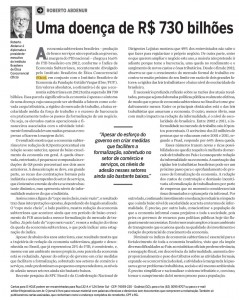A disease of R $ 730 billion
By Roberto Abdenur
The Brazilian underground economy - the production of goods and services not reported to the government, which is outside the national GDP - reached 16,6% of the Brazilian Gross Domestic Product in 2012, according to the Underground Economy Index, recently released by the Brazilian Institute Competition Ethics (ETCO), in conjunction with the Brazilian Institute of Economics of the Getúlio Vargas Foundation (IBRE / FGV). In absolute values, it is estimated that the underground economy in 2012 exceeded R $ 730 billion. This significant portion of the Brazilian economy is only the symptom of a disease whose cause can be attributed to factors such as the high tax burden, the rigidity of the labor market, the low average education of the workforce and the excess of bureaucracy in practically all countries. necessary steps to formalize a business. In other words, the high operational and financial costs associated with the fully formalized activity lead many people and companies to stay outside the law.
The 2012 result shows that the shadow economy had a reduction of 0,3 percentage point in relation to the previous year, despite the low growth of the economy in general. The observed drop, however, is small compared to the 0,8 percentage point reductions in the previous two years. This slowdown is due, in large part, to the decline in formal hires by the industry and the performance of the service sector, which is labor intensive and proves to be quite dynamic, but has higher levels of informality than the industry.
Like the figure of the “half-full, half-empty glass”, the result has two opposite interpretations, depending on the angle at which it is analyzed. The “half-full glass”, that is, the positive side, shows a reduction in the underground economy that happens even in a period of low GDP growth associated with less formalization of the labor market. On the side of the “half empty glass”, we see a reduction in the rate of decline in the shadow economy, which may indicate a stagnation in the index.
But, although below the previous years, this result is important and shows that the trajectory of reduction of the underground, giant and unknown economy in Brazil, which already represented 21% of the GDP, is consistent, and, even in a less favorable environment, this portion of the economy is declining.
Despite the government's effort to create measures that facilitate formalization, especially in the commerce and services sectors, where small entrepreneurs predominate, the levels of membership in these sectors are still quite low.
Research recently released by SPC Brasil and the National Confederation of Shopkeepers showed that almost half (49%) of the interviewees do not know what to do to regularize their business. On the other hand, among those who want to expand the business this year, most do not intend to go ahead because they fear bureaucracy, a drop in income and the appearance of new costs and tax burdens. Since the end of 2012, it has been observed that the growth of the formal labor market is very close to its limit due to two major factors: the rigidity of labor laws and the low level of education of Brazilians.
There is a need for a deep reflection on the reasons for the current results, so that public policies that are really effective are designed, so that the weight of the underground economy in Brazil gradually becomes less. Among the main obstacles to the continuation of this evolution is that of labor laws that bind the economy. The other, less obvious, but with a lot of impact on reducing informality, is the level of education of Brazilians. Between 2002 and 2011, informality in the labor market fell by 10 percentage points, from 43% to 32% of the total employed population. The increase in the 22 million people who were educated between 2001 and 2011, according to PNAD, accounts for 64% of this drop.
These numbers bring new and rich possibilities with regard to the improvement of the labor market in the country and the consequent reduction of informality in the economy. Reducing the underground economy indexes is essential for strengthening the entire Brazilian economy, since it imposes several difficulties on the country: official statistics lose their relevance; tax evasion, due to informality, disproportionately increases the weight of taxes on formal activities; unfair competition expands, and activities outside the law start to generate labor, social and even environmental problems. It is necessary to simplify and rationalize the tax system and, thus, make compliance with the law less painful for the population.
Roberto Abdenur, executive president of ETCO and Fernando de Holanda Barbosa Filho, researcher at IBRE / FGV, Diplomat and executive president of the Brazilian Institute of Ethics in Competition (ETCO).




